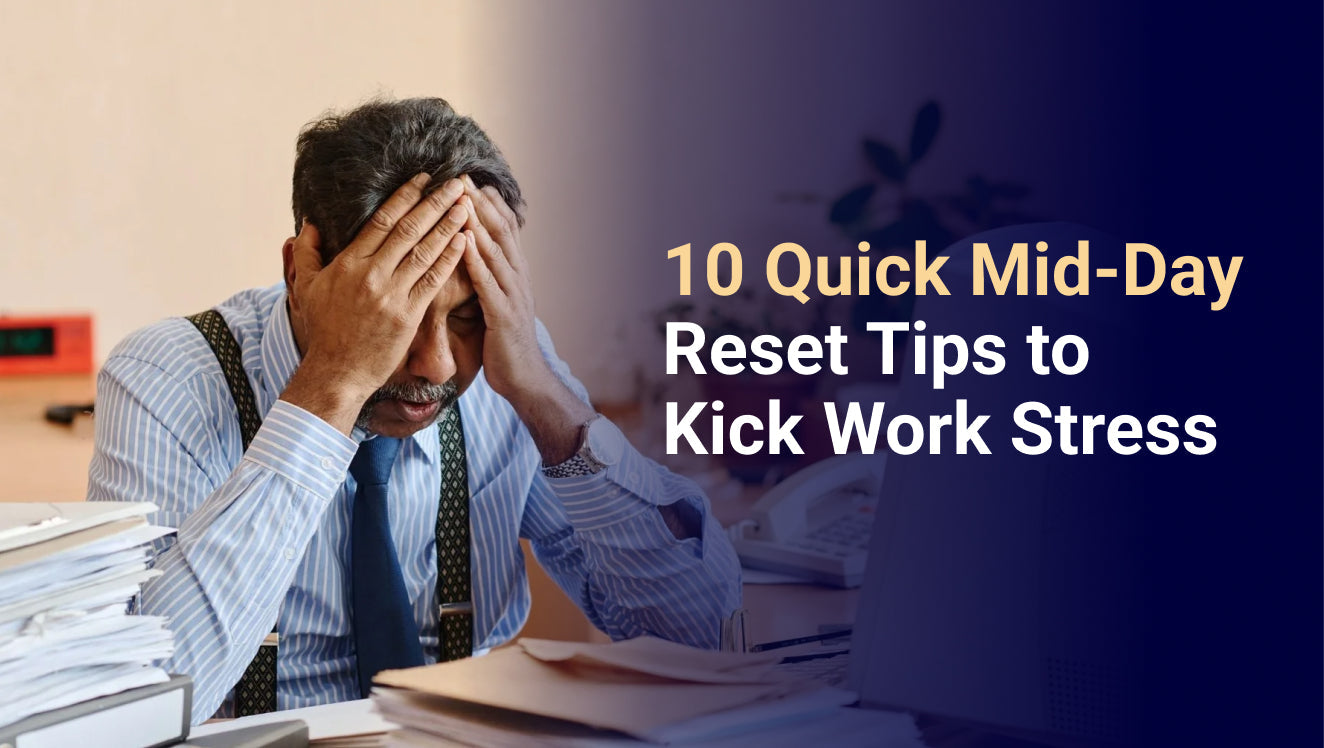It’s noon, your inbox is overflowing, and your coffee’s gone cold. Sound familiar? Mid-day burnout is real and it can derail even the best of days. But here’s the truth: you don’t need a weekend retreat or an hour-long meditation to reset your mind. You just need a few intentional minutes.
These quick mid-day reset tips are designed to help you reduce work stress, recharge focus, and reclaim calm right from your desk. Because yes, you can turn chaos into clarity without ever leaving the office.
1. Breathe Like You Mean It
When stress tightens your chest and mind, your breath is your built-in reset button. Try box breathing: inhale for four, hold for four, exhale for four, hold for four repeat five times.
This pattern activates your parasympathetic nervous system, lowering cortisol and heart rate within minutes (Harvard Health, 2022). It’s simple, free, and surprisingly powerful. Try it before your next meeting eyes closed, shoulders dropped and feel the calm settle in.
2. Move It, Feel It
Sitting too long fuels tension and fatigue. Movement even tiny bursts resets your body and brain.
Roll your shoulders, twist side to side, or take a one-minute hallway walk. Physical motion increases circulation, boosts endorphins, and lowers stress hormones (APA, 2020). Feeling goofy? All the better. Laughter itself is a stress relief mechanism. The goal isn’t exercise it’s movement with intention.
3. Snack Smart, Sip Often
Low energy often isn’t lack of motivation it’s dehydration or blood sugar dips. Keep it steady with smart refuelling: sip water (add lemon or cucumber for flavour) and grab a snack with protein and fibre, like almonds or apple slices.
Research links omega-3s and magnesium to better stress regulation (Nutrients, 2021). Translation? Snack smart, and your mood follows suit.
4. Gratitude Quickie
When stress narrows your focus to what’s wrong, gratitude widens it back to what’s right.
Pause for 60 seconds and name three things you’re grateful for a task finished, a good playlist, a kind message. This quick gratitude check shifts your brain chemistry, increasing dopamine and serotonin levels (UC Davis, 2019). It’s the fastest reframe in the book.
5. Ditch the Phone for Five
Constant pings are micro-stressors that keep your nervous system on high alert. For your next five-minute break, silence notifications, set your phone face down, and look really look at something non-digital.
Maybe it’s the sky, a plant, or your pet. This tiny digital detox interrupts the feedback loop of stress and helps your brain reset attention and calm.
6. Cool Down with neuroVIZR Your Brain’s BFF
Sometimes, your mind is too wound up for mindfulness alone. That’s where neuroVIZR comes in your high-tech mid-day reset.
Using dynamic light and sound stimulation, neuroVIZR guides your brainwaves from high-stress Beta states into calmer, more focused Alpha and Theta patterns. The result? Quick stress relief, enhanced focus, and a clearer mind in as little as 10 minutes.
It’s a neuroscience-backed way to rewire your brain toward balance. Just close your eyes, relax, and let neuroVIZR brain training app do the rest.
7. Scribble the Chaos
Overthinking? Get it out of your head and onto paper. Set a timer for two minutes and brain-dump every thought, worry, or to-do swirling around.
Writing reduces cognitive load, giving your working memory space to breathe (Cognitive Therapy Research, 2020). Once you’ve dumped it, cross out one small win. It’s both cathartic and empowering your mental declutter in real time.
8. Step into Sunlight
A quick step outdoors can do wonders. Just 5–10 minutes of sunlight exposure boosts serotonin, lifts energy, and helps regulate your circadian rhythm (NIH, 2021).
If you can’t go outside, open a window or stand near natural light. Your brain interprets sunlight as safety and vitality an instant stress antidote.
9. Reset Your Eyes (and Mind)
Digital fatigue is real. Every 20 minutes, follow the 20-20-20 rule: look at something 20 feet away for 20 seconds.
It’s not just for eye health it’s a micro-meditation. Shifting visual focus helps deactivate overworked cognitive circuits and re-engages your attention with the physical world.
10. End with a Mini Win
Before diving back into the grind, choose one tiny, achievable task reply to an email, organise your notes, or update a doc.
Completing a small, clear action releases dopamine, the brain’s reward chemical. It gives you a boost of momentum and confidence to tackle bigger tasks without the overwhelm.
The Takeaway
Work stress isn’t going anywhere but it doesn’t have to own your day. These quick mid-day resets aren’t about escaping work; they’re about rebalancing your system within it.
Whether it’s a deep breath, a gratitude pause, or a 10-minute neuroVIZR session, each moment of intentional calm rewires your brain toward clarity and resilience.
You’re tougher than any to-do list. Take five, reset, and return sharper than before.
References
-
Harvard Health Publishing. (2022). How breathing helps reduce stress.
-
American Psychological Association. (2020). The science of movement and mood.
-
Nutrients Journal. (2021). Dietary nutrients and stress resilience.
-
UC Davis Health. (2019). The Science of Gratitude.
-
National Institutes of Health (NIH). (2021). Sunlight and serotonin connection.
-
Cognitive Therapy Research. (2020). Expressive writing as a stress reduction tool.



























Partager:
7 Tiny Mindfulness Hacks for Remote Professionals
The Quiet Power of Subcriticality: How Calm States Strengthen the Brain